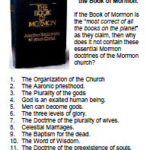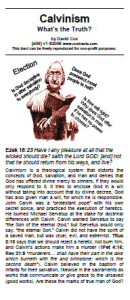Satan, Our Enemy
By David Cox
[doct16] v1 ©2011 www.coxtracts.com
This can be freely reproduced for not profit use.
______________
1Pet 5:8 Be sober, be vigilant; because your adversary the devil, as a roaring lion, walketh about, seeking whom he may devour:
Satan is real, not fiction. He is our enemy, and does everything he can to defeat us in spiritual warfare.
How do we identify our enemy?
Matt 16:23 But he turned, and said unto Peter, Get thee behind me, Satan: thou art an offence unto me: for thou savourest not the things that be of God, but those that be of men.
The word “Satan” means adversary or enemy, and this is used by Jesus towards Peter when Jesus expressed his plans to die on the cross, and Peter opposed this purpose.
Num 22:22 And God’s anger was kindled because he went: and the angel of the LORD stood in the way for an adversary against him.
In this passage, the Angel of Jehovah is identified as “an adversary”. Obviously the Angel of Jehovah is not the devil, but in contrast many theologians identify this angel as the pre-incarnate Christ. So the basic concept of Satan is “the adversary,” or one who opposes another, which in its purest sense, is simply an enemy that confronts someone, whoever that may be. You might think that this concept as a “district attorney”, or an attorney with the task of assigning “blame” and opposing (Zec 3:1). The relationship of Satan as the accuser before God is clear, as in Job 1, but the reasons and the calling to this task are not as clear (if first from God, or after the fall was a voluntary thing by Satan). A very interesting passage in this respect is …
Isa 45:7 I form the light, and create darkness: I make peace, and create evil: I the LORD do all these things.
Notice that God sent adversaries to confront Solomon (1 Ki 11:14, 23, 25). God himself who commands the adversity to oppose (creates their existence, but this opposition is not in itself a sin). This is not to say that God is the author of sin, but He does send bad and difficult things in life to test and prove us. Do not think that God ordains these things just to see us suffer, but as any good trainer will do, he will order his soldiers through the most rigorous training to make them something of great value to the army. In this, although Satan’s motives are not pure in themselves, his activity serves God anyway. Satan is God’s adversary (and of the people who try to obey God’s will, purposes, and do the work of God). The devil IS OUR ADVERSARY (1Pet 5:8), and he walks about seeking whom he may devour, and so it is our duty to resist him. Satan wants our destruction, and not our welfare, and God permits Satan to war against us so as to make us more dependent upon God (the need of faith), and in the end, we will be pure gold (of great value).
The Wicked One
There are various Scriptures which refer to this person in the point of his character “the evil one” or “the wicked one” (Mat 13:19; Eph 6:16; 1Jn 2:13; 3:12). He is wicked. What is wickedness? This concept is simply that he wants to do damage to others in any form or way he can. It is the lack of piety, forgiveness, or mercy. Wickedness is also a disposition to constantly destroy and cause pain and suffering in others.
Arrogance
Isa 14:13 For thou hast said in thine heart, I will ascend into heaven, I will exalt my throne above the stars of God: I will sit also upon the mount of the congregation, in the sides of the north: 14 I will ascend above the heights of the clouds; I will be like the most High.
Satan is marked by his great confidence in his own self, to the point of being pure arrogance (Isa 14:11). This character quality is to have so much self-confidence, to confide in his own intelligence and understanding, that he despises the will of others, even despising God himself. This arrogance in making decisions and acting without seeking any direction from God is where Satan fell. It is his favorite sin. 1Tim 3:6 Not a novice, lest being lifted up with pride he fall into the condemnation of the devil. As Paul unfortunately reveals here, this satanic character is an element that causes (or should cause) an immediate rejection from the ministry if found in a minister.
The Lie, Deception, and Deceit
John 8:44 Ye are of your father the devil, and the lusts of your father ye will do. He was a murderer from the beginning, and abode not in the truth, because there is no truth in him. When he speaketh a lie, he speaketh of his own: for he is a liar, and the father of it. “From the beginning” Satan was always a deceiver. Everything that he pretends to offer or declare is a deception in some form. He nevers presents the full truth, but twists it in some aspect or small part so as to nullify its benefit.
2Cor 11:13 For such [are] false apostles, deceitful workers, transforming themselves into the apostles of Christ. 14 And no marvel; for Satan himself is transformed into an angel of light. 15 Therefore [it is] no great thing if his ministers also be transformed as the ministers of righteousness; whose end shall be according to their works.
Satan has a distinct form of working, and this is the lie. He is “the father of the lie”, and this is where the lie was born, and from which all lies come. Satan’s manner of working is to always present himself and his work in some other form than what it really is. He fabricates another “reality” that is not real. Lies, deceit, distortion are the telltale marks of his work. Eph 4:14 That we henceforth be no more children, tossed to and fro, and carried about with every wind of doctrine, by the sleight of men, and cunning craftiness, whereby they lie in wait to deceive;
The Use of Miracles
2Thess 2:9 Even him, whose coming is after the working of Satan with all power and signs and lying wonders, 10 And with all deceivableness of unrighteousness in them that perish; because they received not the love of the truth, that they might be saved. Satan has a very strong power in our world, and even God refers to his station (given before the fall) as “the god of this world” (2Cor 4:4; Jn 12:31). Satan well knows that the very fact of having supernatural power does not speak as to where the source of that power lies, but so many people are so easily deceived by the fact of a miracle, that Satan puts this lie to good use for his purposes.
The Tempter, the Accuser
Rev 12:10… for the accuser of our brethren is cast down, which accused them before our God day and night. Satan is a condemned criminal in the eyes of God, and he has been destined to judgment, but Satan doesn’t want to go down peacefully.
Satan wants to drag everyone with him into hell that he can so his character is based in tempting and tripping up everybody anyway he can (1Chr 21:1; Luk 22:31). Moreover, he not only wants others to fall, Satan himself is who will be accusing us before God, so that God condemns us just as He will judge Satan. In Job 1:6-12, Satan accuses Job before God Zec 3:1-2; Rev 12:10.
Satanic Aggression
Rev 12:12 Therefore rejoice, [ye] heavens, and ye that dwell in them. Woe to the inhabiters of the earth and of the sea! for the devil is come down unto you, having great wrath, because he knoweth that he hath but a short time.
Satan knows what will be his end, and even so, he still presses forward with his failed plan, and he is in a hurry because his time is short. In his hurry, he resorts to much aggression against humanity so that they trip and fall as quickly and deeply as possible. The Bible tells us Satan is very cruel and brutal in this fight. One thing you will never find Satan really doing is having compassion or mercy because that belongs to the character of God, not Satan. He never pardons, only cruelly pressuring. He is a very dangerous enemy.
The Murderer
John 8:44 Ye are of your father the devil, and the lusts of your father ye will do. He was a murderer from the beginning, and abode not in the truth, because there is no truth in him. When he speaketh a lie, he speaketh of his own: for he is a liar, and the father of it.
In what sense are lies and murder connected? A murderer is someone who completely has no respect of others, and hates somebody so much that he will steal, and even steal that person’s life. Murder is simply an extreme form of aggression. Hurting others, lying to them, and any other forms of harm are simply minor forms of the same aggressive spirit that is behind murder. The hatred here is that one person dislikes another so much that he will not tell the truth (which has blessing attached to it) but rather wants others to hear and believe lies (which has condemnation associated with it). Satan’s greatest work is to remove the love of truth from men so that they are not saved (2Th 2:9-10).
Our Disposition towards Satan
Jude 1:9 Yet Michael the archangel, when contending with the devil he disputed about the body of Moses, durst not bring against him a railing accusation, but said, The Lord rebuke thee.
In October with Halloween, as well as with Hollywood culture, they paint Satan in a red jump suit with horns and a tail, so as to minimize him as a real threat. We should note that God originally gave him great power and authority (“the god of this world” 2Cor 4:4), and he is a prince. Isa 14:9 Hell from beneath is moved for thee to meet thee at thy coming”. So he is a dangerous opponent not to be underestimated or taken lightly, and even the archangel Michael knows his ability (Jude 1:9). He is a very powerful enemy, but God is greater.
Satan’s Limits
Job 1:12 And the LORD said unto Satan, Behold, all that he hath is in thy power; only upon himself put not forth thine hand. So Satan went forth from the presence of the LORD.
Satan is not equal in power with God. He is a creature of God, and dependent upon God for his existence, just as we are. He is limited to what God permits him to do. Satan can only act to the limits which God allows him, and every child of God should always remember this.
Matt 8:31 So the devils besought him, saying, If thou cast us out, suffer us to go away into the herd of swine.
Satan and his demons are restricted by God’s being and power. Yes he allows them to act for now, but judgment day is coming, and God will not allow them to go beyond certain limits (Jn 19:11; Mt 12:28).









